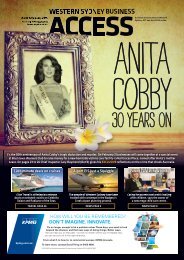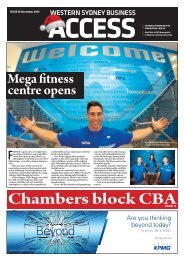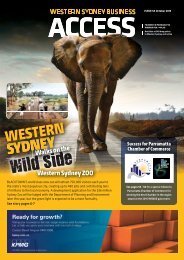RECRUITMENT
WSBA September 2015
WSBA September 2015
You also want an ePaper? Increase the reach of your titles
YUMPU automatically turns print PDFs into web optimized ePapers that Google loves.
GWSRR<br />
“On the employer side the the employer doesn’t know what the business<br />
will look like in five years.” - David Pring.<br />
WWW.WSBA.COM.AU<br />
“<br />
In addition to all of the skills....is how<br />
resilient is someone to working in an<br />
environment of change. We all tend to<br />
dislike change. We all like security.”<br />
- David Pring.<br />
GWSRR in action.<br />
Continued from page 25<br />
Nicole Karagiannis: When looking for<br />
quality staff, the important person in that<br />
equation is – firstly, if you look at it from the<br />
consumer end, really, what do we do? We<br />
offer a service for our patients or consumers.<br />
So, they’re important – they’re the ones at<br />
the heart of what we’re doing or looking for.<br />
Therefore, to be looking for quality staff, we<br />
need to have our patients’ needs at the centre<br />
of that search, really. Secondly, our employees<br />
or future employees our assets. So, if we’re<br />
people in the business of looking after people,<br />
that becomes very much our asset.<br />
Jim Taggart: Scott how do you feel about<br />
Nicole’s response there – you know, in terms<br />
of employer/employee? You’re in the recruitment<br />
industry – profession. Who is the significant<br />
player in that relationship with you?<br />
Scott Henshaw: My immediate thought<br />
was: I don’t think either is more important<br />
than the other. I mean, for a talented professional<br />
in the market to secure a role that he<br />
or she enjoys, is motivated and willing to<br />
support their ongoing professional development,<br />
it’s about finding the right employer<br />
for them. To say that the employer is more<br />
important than the candidate in that equation,<br />
I just don’t think marries up. I think they are as<br />
equally important components for the success<br />
and longevity of the relationship.<br />
Jim Taggart: David, you deal with a<br />
number of organisations. How do you feel<br />
about that, when they come to you and you’re<br />
looking at their balance sheet and their profit<br />
and loss and so on, and they say X, Y and Z,<br />
does staff come up as an important part of that<br />
equation?<br />
David Pring: Certainly when you’re<br />
looking at a business and the strengths of the<br />
business, sure, you have a balance sheet and<br />
assets. One of the big issues that always comes<br />
up in determining the value of an organisation<br />
is its assembled workforce. And that’s really<br />
an intangible asset. It’s not recorded on the<br />
balance sheet. It’s not recorded anywhere. But,<br />
in terms of determining value, organisations<br />
will look at what that assembled workforce is<br />
and what the intangible value that that actually<br />
brings – or part of the market value that forms<br />
in addition to its assets.<br />
Michael Walls: What does that mean –<br />
the assembled workforce?<br />
David Pring: The way staff is assembled,<br />
and together, brings a value greater than<br />
simply having a number of employees. So, that<br />
workforce has the right skills for the organisation.<br />
Jim Taggart: I want to impose a question:<br />
Do employers really know what they’re<br />
looking for?<br />
Alison Wood: Well, I think a lot of employers<br />
do know what they’re looking for – especially<br />
small businesses – really small. I think<br />
people who are recruiting apprentices, for<br />
instance, usually know what they’re looking<br />
for, and they have trouble finding it. But there<br />
are changes that are happening over every industry<br />
area. So, every industry area is basically<br />
in transformation – the digital transformation,<br />
apart from everything else. So, even working<br />
out what is the best fit for recruitment, for<br />
both the applicant and the company, is not<br />
enough. It’s the transformation that’s happening<br />
all the time, and it’s a constant rebooting<br />
the workforce for the changes that are happening,<br />
industry by industry. So, often employers<br />
don’t know what could be happening<br />
industry-wide. And I think that’s where we’ve<br />
got a role because our trainers often do.<br />
Tom Graham: It’s a very broad comment<br />
on this. But, I’ll just give you an example of<br />
a case when I’ve actually gone to talk to an<br />
employee. We’ve done a presentation about<br />
superannuation and we always have oneon-one<br />
discussions. When they come and<br />
sit down, we say: How’s it going? And sometimes<br />
it’s: This is confidential, Tom. They find<br />
themselves at times in a predicament whereby<br />
they’re not all that happy in the environment<br />
they’re working in. They’re not even telling<br />
the boss about this. However, they’re caught<br />
in a predicament. They’ve got big mortgages.<br />
And I don’t know if you understand just how<br />
high - the average is about $600,000 now. It’s<br />
just ridiculous. So, they need the work. But<br />
they’re not really happy with the environment<br />
and they’re not really prepared to be a bit<br />
more outspoken. I get that from just talking to<br />
employees. I feel like I should go and talk to<br />
their superior about it. But they’ve said: No,<br />
this is confidential.<br />
Tom Graham: I wouldn’t say it’s “normal”<br />
and I’m not saying they’re necessarily disgruntled,<br />
they just don’t think they can talk openly.<br />
They feel it’s so sensitive to maintain that job,<br />
they don’t even feel comfortable opening up<br />
to the employer.<br />
Scott Henshaw: It’s almost as if they don’t<br />
feel that they should bring that type of subject<br />
matter into the workforce.<br />
Tom Graham: Yes, exactly they’re thinking<br />
in the back of their mind: Gosh, if I lost<br />
the job, how am I going to keep the mortgage<br />
payments going?<br />
Tom Graham: Yeah, exactly. Yes. Exactly.<br />
Yeah. You know. ‘Cause they’re thinking in<br />
the back of their mind: Gosh, if I lost the job,<br />
how am I going to pay the – keep the mortgage<br />
payments going?<br />
Jim Taggart: That’s very interesting<br />
because our current unemployment rate’s<br />
around 6.3 and it’s rising, and that psychological<br />
impact of keeping that job or all of those<br />
things behind it is quite established in the<br />
literature. Alison, can I ask you a question<br />
here? And the question is: Is education the<br />
leader or the reactionary to change in employment<br />
skill development? I’m really interested in<br />
how people view that.<br />
Alison Wood: Probably there isn’t a<br />
simple answer. But we would like to position<br />
ourselves as a leader because for those<br />
industry areas that are really finding it hard to<br />
keep up. I’ll give you an example. We’ve got<br />
a new degree course in IT network security.<br />
And we’re adding the second strand to that<br />
for 2016, which will be in data analysis. Now,<br />
there’s not a business – a medium to large<br />
sized business around that isn’t going to have<br />
to get their heads around the amount of data<br />
there is and how to use it to build your business.<br />
So, we do need to be a leader in an area<br />
like that, in building up workforce capability.<br />
But, on the other hand, there are plenty of<br />
times when an industry knows the direction<br />
that it’s going in and it doesn’t have the right<br />
workforce to assist it to go in that direction.<br />
And, in that case, we have to listen to what<br />
industry is saying and work with them to try<br />
and upskill the workforce in the directions of<br />
that. So, it’s both really.<br />
Jim Taggart: And that’s quite interesting<br />
in itself, if I can just make a brief comment<br />
– because a number of associations in<br />
industries are becoming RTOs themselves and<br />
competing for that training dollar, if you like,<br />
out there. I’m not saying that’s a good thing<br />
or a bad thing. But it’s a phenomenon that is<br />
out there in the marketplace that I think we<br />
need to address later. In terms of that, Scott,<br />
how do you feel about that? Are qualifications<br />
critical? Or is it the skills? And if so, is there a<br />
difference? And, what do you look for when<br />
someone comes for – well, to seek an employment<br />
that you’ve been given the brief by an<br />
employer?<br />
Scott Henshaw: Are qualifications<br />
important? Absolutely. And I think more and<br />
more becoming so. I think in a market that’s<br />
highly competitive often the easiest and first<br />
box to tick, I suppose, is: Does this person have<br />
the relevant piece of paper that I need for them to<br />
do this job?<br />
Jim Taggart: And how do you do that?<br />
Scott Henshaw: You is the key word<br />
there. And Alison’s point earlier I think was<br />
quite valid around this brief of seeing and<br />
feeling a distinct trend towards the need for<br />
business to better understand what it is they<br />
actually want. You could argue that, not that<br />
Continued on page 27<br />
26 WESTERN SYDNEY BUSINESS ACCESS SEPTEMBER 2015






